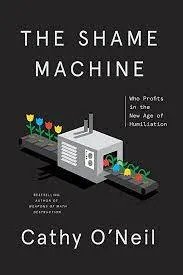By Russell Hartley, Digital Content Associate, EveryoneOn
As I wrap up my final semester as a Master’s in Communication student at Grand Valley State University, I’ve started reflecting on how I went from starting a program with no idea what I wanted to do with a M.S. degree to having an interest grow into an obsession. This transition was kickstarted due to the influence and pedagogical efforts of my professors, especially Alex Nesterenko, Ph.D. and Corey Anton, Ph.D. who opened my eyes to the importance of this field by introducing me to this literature. My interest was amplified further after I joined the digital equity nonprofit EveryoneOn, and I continued to read from authors who have written revolutionary material to bring the issues of the digital age to the forefront of digital discourse.
If you’re like me and interested in digital communications and concerned about its implications for our democracy, political discourse and mental well-being, then I recommend the following reads:
The Age of Surveillance Capitalism by Shoshana Zuboff
Read this if: you want to develop a fundamental understanding of not only the inner-workings of tech giants like Google, YouTube, or Facebook, but also if you want to better understand where all this “data exhaust” is going. Dr. Zuboff is a leading academic and author in the digital communications field and has inspired many to further research the issues of “surveillance capitalism” that are thoroughly presented in this incredibly important read.
The Chaos Machine by Max Fisher
Read this if: you’ve ever heard of social media. Sounds like everyone, right? Well that’s who should read this. As New York Times contributor Ezra Klein said, this is “an essential book for our times,” and it speaks to the driving forces behind social media content consumption that are radicalizing users at an alarming rate.
The New Fire by Andrew Imbrie & Ben Buchanan
Read this if: you’re interested in AI and want to know “how we got here” in terms of AI development as well as how AI may shape the geopolitical landscape and what this means for democracies worldwide. In other words, if you’ve heard about ChatGPT, then read this book.
The Misinformation Age by Cailin O’Connor & James Owen Weatherall
Read this if: you want to better understand not only how false beliefs spread but also how scientific consensus forms and what we can do about how to address the spread of misinformation. This book in particular inspired me to research more about the nationalization in our local political issues.
Meme Wars by Joan Donovan, Emily Dreyfuss & Brian Friedberg
Read this if: you want to learn about online radicalization efforts AND you want to read a really well-written story. The story this book details can get pretty dark, but it’s necessary as to shine a light on the darkness that prevails over platforms like 4chan or 8kun (formerly 8chan), and how these online communities radicalize individuals to commit violence and real world atrocities.
The Shame Machine by Cathy O’Neil
Read this if: you want to learn more about the players and systems behind the culture of online shaming (and also if you’re a fan of Cathy O’Neil’s Weapons of Math Destruction). This is a crucial read for anyone looking to understand the difference between healthy and unhealthy online shaming and the role in which shame should play in our digital discussions.
The Fight for Privacy by Danielle Keats Citron
Read this if: you read any of the books above and want to focus more on the potential solutions that can help address the undemocratic practices of big data and social media companies.
Follow Russell M. Hartley on Twitter @russellmhartley or Mastodon @russellmhartley@newsie.social








